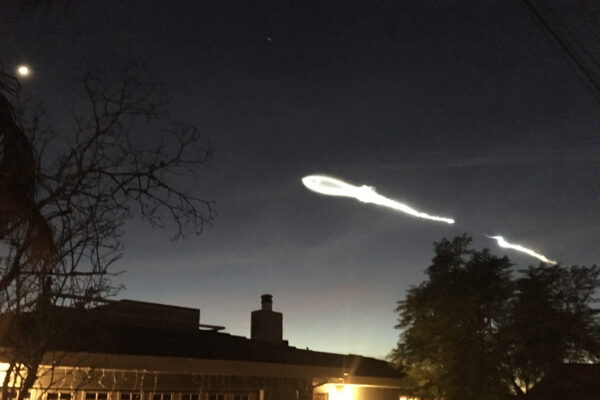2018 is a liminal year in America, and with transition comes uncertainty. It is the year of key midterm elections, the results of which are difficult to predict. A major investigation continues to plague our head of state, whose behavior remains as erratic as ever. New movements—such as #MeToo and the Poor People’s Campaign—are taking off with their impacts unknown. For hundreds of thousands of immigrants and their families, the uncertainty is personal, as they seek to rectify their immigration status, avoid Immigration and Customs Enforcement, and wait to see whether the courts or Congress will allow them to stay in the country.
Such uncertainty breeds anxiety, but it also opens the door to hope. As we look ahead to the trends in religion that we’ll be watching in 2018, therefore, we gravitated toward the ways in which religion and spirituality might answer those anxieties. We are already seeing many of these trends start, but some are also somewhat prescriptive. If faith groups want play a significant role in public life this year, they might want to look at how they can tap into these five trends. (We did pretty well with our trends last year, after all.)
Reported UFO Sightings on the Rise
It seems like Americans have become so starkly polarized that neither side of the political divide can connect with the other. Is there anything we can agree on? Well, yes: UFOs. Check out the stories you get when you search for “UFO” on the Fox News and CNN websites, and you’ll see some remarkable similarities in the tenor of the reporting—as well as a steady stream of stories. Also popular: tarot cards, essential oils and astrology.
Why are people who either loathe or love Donald Trump in sync when it comes to supernatural phenomenon? It seems to be yet another symptom of our unsettled period of religious flux. Jeffrey Kripal—a professor of religious studies at Rice University and the author of several books on the mysterious, the mystical and the paranormal in American culture—says interest in UFOs is about “a massive deconstruction of our religious histories and their sky gods.”
The supernatural erupts into the everyday when old certainties begin to crumble. We can attempt to end the version of chaos that most disturbs us by clamoring to build a wall or shaking our fists at Trump’s political base. Then the mysterious lights will appear in the sky again to remind us that we should be awed by a cosmos that is literally beyond our comprehension. With 2018 bringing no more certainty into our lives, that cycle isn’t likely to wind down any time soon. Expect more stories about the mysterious.
(Image above is nothing mysterious, though: Just a SpaceX launch above Los Angeles.)
In What Do We Trust?
Traditional institutions will continue to struggle in 2018. Religious membership is declining, even if some trends point to an anecdotal buoying of congregational attendance among those seeking solace during the Trump presidency. Congressional approval ratings remain in the teens, as they have been for the past few years.
While some traditional religious groups and government and civic institution are hopeful for a resurgence of relevance, we see the lack of trust in institutions leading to two responses that will continue to play out in 2018: a desire to deconstruct or dismantle institutions that some no longer trust (think the desire to dismantle the police and criminal justice system); and a desire to bypass institutions altogether by building alternative options (think crypto-currencies like bitcoin).
Meanwhile, those who believe in the resilience of institutions will continue to hold out hope that others will simply “get it” and wake up to the realization that institutions are essential, resulting in a resurgence of their importance. Those who are critical of institutions or simply ignore them, however, aren’t likely to alter course. And as long as institutions rely on legacies of the past centuries and remain tone deaf to critiques of traditional belief and the creative energy being invested elsewhere, they will miss the opportunity to reconstruct themselves for the next century. Smaller groups (think reimagined communities) may have success in building trust, but larger institutions still have a long way to go in cultivating the trust they need to stay strong.
Activists Rebrand as Healers
As a young presidential candidate, Barack Obama introduced the public to organizing and made “organizer” into a sexy job title. This year the political climate will make activists rebrand again, this time taking on the title of “healer.”
We already have seen Black Lives Matter adopt “healing” as a central practice and in the past year, we have heard about healing circles for DACA recipients to help them cope with the stress of not knowing what their futures hold. As the current administration continues to create uncertainty, the left and even the center will gravitate to activist leaders who can provide a sense of healing and stability.
But it’s not just external threats that are causing people anguish; healers will become especially important this election year as they mend wounds from in-fighting within liberal circles and the attacks of self-serving “social justice warriors” who sow division.
Key to Winning in 2018 Midterm Elections: Faith-Based Mobilization
Local and state elections in 2017 proved how every vote can make a difference. So we expect congregations to play a significant role in getting their members to the polls in November 2018.
Black women’s decisive role in electing Doug Jones in Alabama this past year suggests that the Black Church could be the key for Democrats. Like the movement Martin Luther King, Jr. started shortly before he was killed 50 years ago, the new Poor People’s Campaign is led by diverse faith leaders and aims to heal (see above) racial divisions while tackling common economic challenges. We are not ready to predict that this activism will lead to victories on election day, as these activists face significant barriers of voter registration laws and gerrymandering. The Black women—and men—who showed up for Doug Jones will need to lead not only their own communities, but also convince the white working class voters who once supported Obama in places like Pennsylvania and Michigan to return to the Dems. Perhaps we’ll see voter registration drives in reverse from 50 years ago.
For the Republicans, the 2016 election showed that you cannot discount the political force of white evangelicals. Some are distancing themselves from evangelicalism in the Trump era (indeed, it does seem that the public has discovered a new species of evangelical in recent months—a trend we’ve been writing about for a while and predicted last year). At the same time, white evangelicals make up a sizeable group of loyal Republican voters, their organizational capacity far exceeds the religious left, and they have presidential backing. Even if the Johnson Amendment has not been lifted yet, we expect to see white evangelical leaders emboldened to endorse candidates and to be strategic in mobilizing their base for Republicans this year.
Whichever side wins the Senate and House, we predict that any analysis of the 2018 election will have to take faith-based mobilization into account.
#MeToo Brings Change in “Church” Leadership
The #MeToo movement captured the attention of a global audience in 2017, growing quickly into a tide of change around sexual assault, harassment and gender-based violence. The hashtag has been translated into multiple languages and shared in 85 countries. It has made waves across sectors, including within diverse faith communities, from the Mormon community and the Southern Baptist Convention to Jewish communities in Israel and Muslim communities around the world. In 2018, we expect to see allegations against powerful men across faith traditions continue to mount as faith groups grapple with hard-to-accept realities revealed about revered men.
More than allegations, we also are beginning to see real shifts in leadership, with women taking the helm of major congregations for the first time. In the Black Church, in particular, women are being chosen as successors or pushed into the spotlight due to the wrongdoings of either elder statesmen of the church or their spiritual sons. While many communities have restrictions on female leadership, we expect the #MeToo movement to be transformative in 2018, not just through raising awareness, but also through changing the leadership of many faith organizations.
https://twitter.com/nehadixit123/status/920178452120027137




